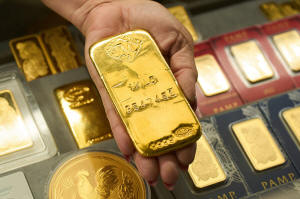Gold prices topped $4,300 this week. What's driving the surge?
[October 18, 2025] By
WYATTE GRANTHAM-PHILIPS
NEW YORK (AP) — As economic uncertainty deepens, the rush for gold
continues — with prices for the precious metal topping $4,300 for the
first time this week.
The going price for New York spot closed at a record $4,326 per troy
ounce on Thursday. Futures also traded as high at more than $4,344 per
troy ounce Thursday, before falling below the $4,300 mark Friday
morning. Still, gold is up 6.7% over the last week, marking one of its
best weeks to date.
Gold sales can rise sharply when anxious investors seek a “safe haven”
for their money. For the U.S., the latest gains arrive amid the now
weekslong government shutdown and ongoing trade wars abroad — with
President Donald Trump most recently threatening to place much higher
tariffs on China, before appearing to walk back those potential new
levies as unsustainable. Still, his barrage of other import taxes has
already strained economies worldwide. Meanwhile, the prospect of lower
interest rates is also making gold a more attractive investment.
How much have gold prices climbed this year? What about silver?
Gold futures are up nearly 60% since the start of 2025 — trading at
about $4,268 per troy ounce, the standard for measuring precious metals,
as of around 11:45 a.m. Friday. That’s up from around $2,670 at the
beginning of January.
Silver has seen an even bigger percentage jump year to date. Silver
futures are up about 70%, trading at over $50 per troy ounce Friday
morning.

Why are prices going up?
A lot of it boils down to uncertainty. Interest in buying metals like
gold typically spikes when investors become anxious.
Much of this year's economic turmoil has spanned from Trump’s trade
wars. Since the start of 2025, steep new tariffs the president has
imposed on goods coming into the U.S. from around the world have
strained businesses and consumers alike — pushing costs higher and
helping to weaken the job market. As a result, hiring has plunged while
inflation has inched back up. And more and more consumers are expressing
pessimism about the road ahead.
The U.S. government shutdown adds to those anxieties. Key economic data
has been delayed — and scores of federal employees are already feeling
the effects of furloughs and working without pay as long as the shutdown
lasts, which has no immediate end in sight. The Trump administration
also moved to use the shutdown to conduct mass firings, although a judge
temporarily blocked such action.
Separately, analysts have pointed to continued weakness of the U.S.
dollar and renewed rate cuts from the Federal Reserve. Last month, the
Fed cut its key interest rate by a quarter-point — and projected it
would do so twice more this year.
Investments in gold have also been driven by other factors over time.
Over recent years, there's been strong gold demand from central banks
around the world — particularly amid heightened geopolitical tensions,
such as the ongoing wars in Gaza and Ukraine.
And on Wall Street this week, several regional banks saw sharp losses
amid scrunity over quality of loans, although recovery seemed to be
steadying the market on Friday. Meanwhile, investors appeared to be
distancing themselves from riskier assets like cryptocurrency — with
bitcoin, for example, down 2.67%.
[to top of second column] |

Sam Nguyen shows a gold bar at her shop in the St. Vincent Jewelry
Center in the Jewelry District of Los Angeles, Wednesday, April 30,
2025. (AP Photo/Jae C. Hong, File)
 What about jewelry?
Many jewelry merchants and dealers have increasingly reported surges
in customers looking to check the value of gold they own — sometimes
opting to melt or sell family heirlooms to cash in on the precious
metal's rising price.
At the same time, those in the market for gold jewelry may be
feeling “sticker shock” if they can’t afford certain products
anymore — particularly if it's something impacted by both rising
material costs and tariffs.
Larger retailers like Pandora and Signet have acknowledged these
headwinds in recent earnings calls.
Is gold worth the investment?
Advocates of investing in gold call it a safe haven — arguing that
the commodity can serve to diversify and balance your investment
portfolio, as well as mitigate possible risks down the road as a
hedge against rising inflation. Some also take comfort in buying
something tangible that has the potential to increase in value over
time.
Still, experts caution against putting all your eggs in one basket.
And not everyone agrees gold is a good investment. Critics say gold
isn’t always the inflation hedge many claim — and that there are
more efficient ways to protect against potential loss of capital,
such as derivative-based investments.
The Commodity Futures Trade Commission has also previously warned
people to be wary of investing in gold. Precious metals can be
highly volatile, and prices rise as demand goes up — meaning “when
economic anxiety or instability is high, the people who typically
profit from precious metals are the sellers," the commission noted.
Gold demand escalates mercury poisoning warnings
The frenzy for gold has also resulted in health and environmental
consequences — with officials pointing to rising demand for mercury,
a toxic metal that is key in illegal gold mining worldwide.
Mercury is widely used to separate gold during artisanal or
small-scale mining. But it pollutes water, accumulates in fish,
makes its way into food and builds up in people’s bodies, leading to
neurological and developmental harm. Even small-scale exposure can
carry serious risks — putting in danger workers who rely on the
industry, as well as residents in affected areas more broadly.

The Associated Press has reported about the effects of mercury
poisoning tied to gold mining in countries like Senegal, Mexico and
Peru, among other parts of the world.
All contents © copyright 2025 Associated Press. All rights reserved |